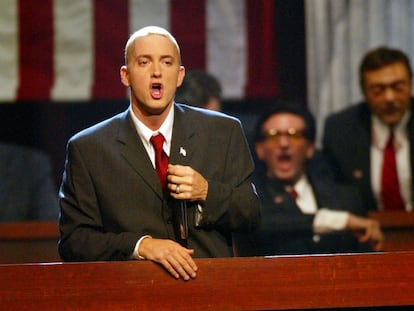When Eminem refused to be Elvis Presley and made enemies along the way
‘The Eminem Show’ turns 20 this year. The album cemented the rapper’s controversy-ridden fame, despite some more introspective lyrics, and it coincided with the premiere of his Oscar-winning film ‘8 Mile’


By 2002, Eminem needed to get rid of Slim Shady. The rapper’s alter ego was taking him down the wrong path. The musician, whose real name is Marshall Mathers, had followed his first EP, The Slim Shady EP (1997) with the album The Slim Shady LP (1999) as a way to counter criticism of the serious, dramatic tone of his debut album, Infinite (1996). The Slim Shady character was a loudmouth, satirical version, and it got Mathers into constant trouble, bringing him significant public notoriety. After insulting pop stars like Christina Aguilera, Britney Spears, *NSYNC and the Backstreet Boys in his songs, the character–who even had his own cartoon series, The Slim Shady Show–now threatened to devour its creators.
Eminem later reflected that his life at that time had turned into a circus. With the upcoming release of his own semi-biographical film, the critical and commercial hit 8 Mile (2002), the rapper decided to make a public spectacle of his circumstances. Satirizing his own fame and his character, Eminem conceived of The Eminem Show, which was leaked to the public at the end of May 2002 and is now turning 20. The album’s title could be read as a counterpart to The Slim Shady Show, but it was primarily inspired by the movie The Truman Show (1998). The rapper even declared that his album “was written by Jim Carrey,” the protagonist of the drama in which a normal man unknowingly lives in a reality television program watched by millions.
The song titles, like “Cleanin’ Out My Closet,” reflect the album’s self-referential character. Its lyrics now took aim more at his own dirty laundry than that of the star system. “One of the most frustrating things for me was people saying I needed to swear to sell records. I wanted to show that I’m a solid artist and that I’m here to stay,” the rapper said in an interview at the time with Spin magazine. “Cleanin’ Out My Closet” itself, in fact, was a settling of accounts with the rapper’s own mother, who had previously denounced him for attacks in other songs including “My Name Is” or “Marshall Mathers.”
Other songs, like “‘Till I Collapse,” “White America” and “Sing for the Moment,” with its recognizable sample from Aerosmith’s “Dream On,” gave the album a confessional quality. The lyrics also openly criticized the administration of then-President George W. Bush. The rapper would later be investigated by the Secret Service as a result of his lyrics’ possible threats towards the White House’s tenant, an achievement that he would repeat under the presidency of Donald Trump.
The Eminem Show, despite its intentions, also contained its own catalog of invectives–some more subtle than others–against its peers on the charts . The song “Superman” marked the beginning of the rapper’s long controversy with Mariah Carey, with whom the rapper claimed to have had a tumultuous relationship. The singer of “All I Want for Christmas Is You” denied the allegation. She would later dedicate the song “Obsessed? to him. The controversy would enter an impasse years later, when Eminem threatened in another song (”The Warning”) to publish intimate photos of the New York artist. In 2020, rumors that Mariah Carey would talk about Eminem in her biography worried the rapper, according to sources from US Weekly, because “she was always his Achilles’ heel, and they had a very toxic relationship.” Eminem was not mentioned in the book, although Mariah Carey parodied him last year by appearing dressed as him on TikTok.
Against “Elvisism”
In The Eminem Show, the artist also delved into the theme of his status as a white rap star, which he also addressed in the film 8 Mile. In the song “White America,” for example, he pointed out the hypocrisy around the great concern that his lyrics had caused–greater, in his opinion, than that caused by Black rappers, because he was listened to by white youth. “Surely hip-hop was never a problem in Harlem, only in Boston,” he quipped. And in the song “Without Me,” composed together with Jeffrey Bass and famous for its bass riff, surely one of the best known in history, Eminem directly addressed his parallels with Elvis Presley, another icon who also went down in history for succeeding in a genre developed by the Black population.
Eminem was far from the first white rapper to be famous–in fact, on the cover of his 2018 album Kamikaze, he paid tribute to the Beastie Boys, a white group that succeeded in hip-hop long before him. But the discussion about whether the Missouri artist is an example of cultural appropriation continues even today. Many Black rap figures, however, have argued that Eminem’s case is radically different from that of Elvis Presley. Chuck D, leader of Public Enemy, has frequently spoken of him as an example of a white musician who stands up to “Elvisism,” the phenomenon of adopting others’ music without acknowledging its originators and even being openly racist towards them.
In addition to the album’s collaborations with artists such as Dr. Dre and Nate Dogg, the song “Till I Collapse” includes a section in which Eminem cites all the Black rappers who influenced him. “Eminem has earned a pass, in the same way that Black people, during the days of segregation, had to prove that they were better than the average person to be accepted,” Stephen Hill of Black Entertainment Television declared in 2002, praising his technical ability and vocal speed.
With 27 million copies sold, The Eminem Show was the most successful album of 2002 and one of the biggest commercial successes of all time. Without breaking with the satirical style of The Marshall Mathers LP (2000), his previous massive success, Eminem’s 2002 album was also a critical success. Due to the inclusion of guitars, the journalist Kris Ex, from Rolling Stone, said it may be the “best rap-rock album in history.” The dean of music criticism, Robert Christgau, wrote that “it represents an articulate, coherent, formally appropriate response to Eminem’s changing position and role, one that acknowledges the privileges and alienations that accrue to all fame as well as the resolution of Marshall Mathers’s worst traumas and the specifics of his success.”
The controversy over cultural appropriation was resolved better than the accusations of homophobia, which Eminem tried to counteract that same year through a collaboration with Elton John. Accusations of misogyny continue to this day. Eminem would close a triumphant year by winning the Oscar for 8 Mile’s title song, “Lose Yourself,” the first hip-hop song to do so. But he then entered a stage of decline, developing a drug addiction to keep up with his demanding workload. He later disappeared from the public eye and gained weight, coming to weigh over 100 kilos–another parallel with Elvis, to whose biopic directed by Baz Luhrmann, which opens this week, Eminem has contributed a song.
Twenty years later, the artist is still in the limelight, despite the fact that his latest works have generated significantly less interest than his early releases. Eminem closed his long-running feud with his mother on another song, “Headlights,” and now claims to feel ashamed of “Cleanin’ Out My Closet,” though his lyrics continue to bother her. (In 2017, actress Jamie Lee Curtis asked him on Twitter if he had a daughter, in response to a letter where Eminem spoke of murdering her, in relation to an old statement by Curtis about not allowing children listen to the rapper.) But the artist’s recent controversies do not have the weight they once did, despite Eminem’s valiant attempts to position himself as the victim of a TikTok campaign allegedly seeking to “cancel” him for his language. Data from the hashtag #CancelEminem2021 showed that the majority of posters behind the alleged campaign were millennials complaining that new generations wanted to cancel Eminem.
@eminem “They blame me 4 murdering Jamie Lee Curtis said I put her face in the furnace, beat her with a space heater.”
— Jamie Lee Curtis (@jamieleecurtis) February 4, 2017
You have a daughter?
In 2021, the artist’s songs received one billion streams, accumulating a total of 11 billion. The numbers indicate what the artist already intuited two decades ago: his fame is lasting, even without his constant minor controversies.
Tu suscripción se está usando en otro dispositivo
¿Quieres añadir otro usuario a tu suscripción?
Si continúas leyendo en este dispositivo, no se podrá leer en el otro.
FlechaTu suscripción se está usando en otro dispositivo y solo puedes acceder a EL PAÍS desde un dispositivo a la vez.
Si quieres compartir tu cuenta, cambia tu suscripción a la modalidad Premium, así podrás añadir otro usuario. Cada uno accederá con su propia cuenta de email, lo que os permitirá personalizar vuestra experiencia en EL PAÍS.
¿Tienes una suscripción de empresa? Accede aquí para contratar más cuentas.
En el caso de no saber quién está usando tu cuenta, te recomendamos cambiar tu contraseña aquí.
Si decides continuar compartiendo tu cuenta, este mensaje se mostrará en tu dispositivo y en el de la otra persona que está usando tu cuenta de forma indefinida, afectando a tu experiencia de lectura. Puedes consultar aquí los términos y condiciones de la suscripción digital.








































